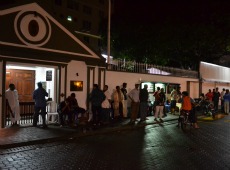The potential for developing a domestic oil industry was launched as a campaign issue during a speech on Monday (January 14) by Progressive Party of the Maldives (PPM) presidential prospect, MP Abdulla Yameen.
Yameen proclaimed “when the PPM comes to power” it will conduct oil exploration, attract foreign investment and create 26,000 tourism jobs.
However, the Maldives’ environmental image and commitments are no obstacles to oil industry development, according to Tourism Minister Ahmed Adheeb – currently standing for nomination as the PPM’s vice president.
Adheeb told Minivan News the Maldives was “a big nation, and places not in marine protected zones or tourism areas could be explored for oil, like in the less developed north.”
“Oil exploration is a term and [we] cannot conclude something with out the details. Regulations and more planning need to be done,” he said.
The ‘Draft Maldives Fourth Tourism Master Plan’ released January 9 by the Ministry of Tourism, Arts and Culture emphasises the need for climate change mitigation, adaptation, and renewable energy as part of its five-year strategic plan.
“The tourism sector is expected to contribute to the carbon neutral goal by introducing measures over the next eight years for energy efficiency and replacing fossil fuel with renewable energy,” the report states.
The plan contains various strategic actions aimed at “developing and enforcing” management plans for [marine protected areas] and sensitive environments. This includes “implementing a low carbon program for the tourism industry”.
“A long-term focus on adopting reliable and affordable energy from renewable resources (like sun, wind, sea and biomass) provides an opportunity to enhance our tourism development model, already well known for its sustainable practices. A low carbon path for development has been identified as key development strategy in Maldives as a whole,” the report notes.
“[Economic] diversification is in line with the tourism master plan,” Adheeb told Minivan News.
“[The] first priority should be tourism [however] the economy needs to be diversified and protected,” he said.
Yameen pledges oil exploration
During the launch of the PPM ‘Team Yageen’ campaign, Yameen declared his platform would focus on foreign investment and the creation of job opportunities, local media reported.
“Given the current economic situation, local businessmen alone cannot create enough job opportunities. We must welcome foreign investors for the benefit of our nation,” Yameen said, according to Haveeru.
Yameen’s proposals include searching for oil, prioritising the tourism industry, and creating a cargo transit port.
Previous oil exploration attempts in 1980 found the cost of retrieving the oil was too high compared to the US$20 (MVR 308) price per barrel at the time. However the present price of US$125 (MVR 1925) per barrel made further exploration feasible.
“It is very possible oil might be found in the Maldives,” Yameen said.
“[The PPM] have a very close relationship with tourist resort owners. The [economic] benefits of the tourism industry are creating job opportunities through the [tourism goods and services] tax,” he added.
Team Umar’s stance
‘Team Yageen’s opposition for the PPM leadership, ‘Team Umar’, played down the proposal.
PPM Interim Vice President Umar Naseer said it was not acceptable for people in responsible portfolios of the government to talk about things that they could not do while they were in power.
Yameen’s proposal to search for oil in the Maldives was not new, Naseer claimed, noting that Yameen had plenty of time during the Gayoom administration to pursue such an agenda.
”Fifteen years is enough time for someone searching for oil to find it. ‘Team Umar’ will not make empty talk; if we are to search for oil, then we will find it and sell it,” said Naseer.
”These words are not new to us. If they had been new words they would have impressed ‘Team Umar’ as well,” he added.
Government biosphere and renewable energy commitments
The development of an oil industry in the Maldives would be an apparent reversal of President Mohamed Waheed’s declaration during the Rio 20+ UN Conference on Sustainable Development in June 2012 that the Maldives would “become the first country to be a marine reserve”.
During the conference, Waheed highlighted the 2012 establishment of the first UNESCO Biosphere reserve in Baa Atoll, as well as the Maldives’ commitment to carbon neutrality and sustainable development.
“Our tourism sector is a sustainable one, relying on the preservation of our magnificent coral reefs, beautiful beaches and our rich and diverse marine life,” Waheed stated.
The Maldives is meanwhile participating in the 3rd General Assembly of International Renewable Energy Agency (IRENA) in Abu Dhabi, United Arab Emirates, which started this week (13 January 2013).
Minister of Environment and Energy Dr Mariyam Shakeela has also highlighted the ongoing renewable energy activities undertaken by the Maldivian government and the necessity of renewable energy for mitigating climate change.
Shakeela recently signed a Memorandum of Understanding (MoU) with the Diesel Replacement Project of the Clinton Climate Initiative’s Clean Energy Initiative, a program of the William J Clinton Foundation.
The focus of this program is to enact “projects and policies that directly reduce greenhouse gas emissions” including renewable energy projects to reduce dependency on diesel fuel.
Likes (0)Dislikes
(0)Dislikes (0)
(0) 


